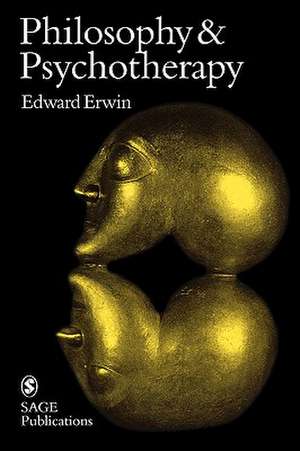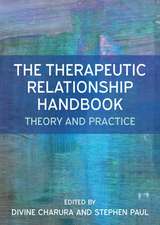Philosophy and Psychotherapy: Perspectives on Psychotherapy series
Autor Edward Erwinen Limba Engleză Paperback – 15 dec 1996
`For those readers who favour an empirical-scientific approach to counselling and therapy, and who view therapy, at least potentially or in principle, as an objective science, this will no doubt be a very useful and informative book... We should be grateful that Erwin has set out more fully than anyone to date the specifically philosophical case for a "science of therapy"; and those of a New Paradigm persuasion at least now know the nature of the arguments they will have to refute in order to sustain their position. I look forward with eager anticipation to their efforts, and to an emerging and fruitful engagement between philosophy and therapy - for both have a great deal to learn from each other' - Counselling, The Journal of the British Association for Counselling and Psychotherapy
This pioneering book analyzes the interface between philosophy and psychotherapy. The first authoritative work to apply rigorous philosophical discipline to therapeutic claims and counter-claims, it will encourage psychotherapists, counsellors and applied psychologists to examine their practice and clarify their thinking.
Edward Erwin discusses some of the key philosophical issues that have a particular relevance to psychotherapeutic theory - autonomy and free choice, the nature of the self, epistemology, and values and morals - as well as examining specific interdisciplinary issues that cut across the boundaries between philosophy and psychotherapy. Finally, he looks at the `crisis' in psychotherapy today, offering a valuable philosophical insight into the debate about the proliferation and efficacy of therapeutic approaches.
| Toate formatele și edițiile | Preț | Express |
|---|---|---|
| Paperback (1) | 438.93 lei 43-57 zile | |
| SAGE Publications – 15 dec 1996 | 438.93 lei 43-57 zile | |
| Hardback (1) | 1375.87 lei 43-57 zile | |
| SAGE Publications – 17 dec 1996 | 1375.87 lei 43-57 zile |
Preț: 438.93 lei
Preț vechi: 516.39 lei
-15% Nou
Puncte Express: 658
Preț estimativ în valută:
84.02€ • 91.29$ • 70.62£
84.02€ • 91.29$ • 70.62£
Carte tipărită la comandă
Livrare economică 21 aprilie-05 mai
Preluare comenzi: 021 569.72.76
Specificații
ISBN-13: 9780803975217
ISBN-10: 080397521X
Pagini: 192
Dimensiuni: 156 x 234 x 15 mm
Greutate: 0.31 kg
Ediția:1
Editura: SAGE Publications
Colecția Sage Publications Ltd
Seria Perspectives on Psychotherapy series
Locul publicării:London, United Kingdom
ISBN-10: 080397521X
Pagini: 192
Dimensiuni: 156 x 234 x 15 mm
Greutate: 0.31 kg
Ediția:1
Editura: SAGE Publications
Colecția Sage Publications Ltd
Seria Perspectives on Psychotherapy series
Locul publicării:London, United Kingdom
Recenzii
`Erwin's argumentative skills and knowledge of the literature are remarkable and most of his original claims are persuasive....The merit of the analysis Erwin offers is to provide a well-informed and accessible account of the current state of psychotherapy, its history and its philosophical grounds' - Metapsychology Online
`Psychotherapy urgently needs to learn from philosophy... considering how much philosophy has to say about the human issues that psychotherapists work with and how much it can contributre in terms of clarity, consistency and breadth and depth of thinking about all this... Erwin's book makes philosophy accessible to psychotherapists. He shows how important philosophical analysis is in order to gain clarity about the theories and methods of psychotherapy... Erwin's book is an excellent antidote to psychotherapeutic complacency. It is a book that requires one to question oneself as a psychotherapist and which reveals how much remains hidden underneath professional pomposity and dogmatism... I would certainly recommend this book most strongly to all psychotherapists and counsellors, most especially to trainees' - The European Journal of Psychotherapy, Counselling & Health
`[The book] includes detailed and illuminating discussions about efficacy, the placebo effect and therapist "expertise"... For those readers who favour an empirical-scientific approach to counselling and therapy, and who view therapy, at least potentially or in principle, as an objective science, this will no doubt be a very useful and informative book... We should be grateful that Erwin has set out more fully than anyone to date the specifically philosophical case for a "science of therapy"; and those of a New Paradigm persuasion at least now know the nature of the arguments they will have to refute in order to sustain their position. I look forward with eager anticipation to their efforts, and to an emerging and fruitful engagement between philosophy and therapy - for both have a great deal to learn from each other' - Counselling, The Journal of the British Association for Counselling
`Erwin's analyses are interesting and intellectually provoking' - British Psychological Society History and Philosophy of Psychology Newsletter
`Stimulating, exciting - and not for the faint-hearted' - Professor Windy Dryden, Goldsmiths College, University of London
`Psychotherapy urgently needs to learn from philosophy... considering how much philosophy has to say about the human issues that psychotherapists work with and how much it can contributre in terms of clarity, consistency and breadth and depth of thinking about all this... Erwin's book makes philosophy accessible to psychotherapists. He shows how important philosophical analysis is in order to gain clarity about the theories and methods of psychotherapy... Erwin's book is an excellent antidote to psychotherapeutic complacency. It is a book that requires one to question oneself as a psychotherapist and which reveals how much remains hidden underneath professional pomposity and dogmatism... I would certainly recommend this book most strongly to all psychotherapists and counsellors, most especially to trainees' - The European Journal of Psychotherapy, Counselling & Health
`[The book] includes detailed and illuminating discussions about efficacy, the placebo effect and therapist "expertise"... For those readers who favour an empirical-scientific approach to counselling and therapy, and who view therapy, at least potentially or in principle, as an objective science, this will no doubt be a very useful and informative book... We should be grateful that Erwin has set out more fully than anyone to date the specifically philosophical case for a "science of therapy"; and those of a New Paradigm persuasion at least now know the nature of the arguments they will have to refute in order to sustain their position. I look forward with eager anticipation to their efforts, and to an emerging and fruitful engagement between philosophy and therapy - for both have a great deal to learn from each other' - Counselling, The Journal of the British Association for Counselling
`Erwin's analyses are interesting and intellectually provoking' - British Psychological Society History and Philosophy of Psychology Newsletter
`Stimulating, exciting - and not for the faint-hearted' - Professor Windy Dryden, Goldsmiths College, University of London
Cuprins
PART ONE: FOUNDATIONAL QUESTIONS
Autonomy, Free Choice and the Possibility of a Psychotherapeutic Science
Values and Morals
The Self in Psychotherapy
Postmodernist Clinical Epistemology
A Critique
PART TWO: PSYCHOTHERAPEUTIC PARADIGMS
Behavior Modification and the New Behaviorism
Cognitive Therapy and Behavior Therapy
Psychoanalysis and the Psychodynamic Therapies
EPILOGUE
The Crisis in Psychotherapy
Autonomy, Free Choice and the Possibility of a Psychotherapeutic Science
Values and Morals
The Self in Psychotherapy
Postmodernist Clinical Epistemology
A Critique
PART TWO: PSYCHOTHERAPEUTIC PARADIGMS
Behavior Modification and the New Behaviorism
Cognitive Therapy and Behavior Therapy
Psychoanalysis and the Psychodynamic Therapies
EPILOGUE
The Crisis in Psychotherapy
Notă biografică
Descriere
`For those readers who favour an empirical-scientific approach to counselling and therapy, and who view therapy, at least potentially or in principle, as an objective science, this will no doubt be a very useful and informative book... We should be grateful that Erwin has set out more fully than anyone to date the specifically philosophical case for a "science of therapy"; and those of a New Paradigm persuasion at least now know the nature of the arguments they will have to refute in order to sustain their position. I look forward with eager anticipation to their efforts, and to an emerging and fruitful engagement between philosophy and therapy - for both have a great deal to learn from each other' - Counselling, The Journal of the Br






















